Cinnamon is a popular spice that has been used for centuries for its medicinal properties. One of its most promising benefits is its potential to help manage diabetes. Diabetes is a chronic condition that affects millions of people worldwide, characterized by high blood sugar levels due to the body’s inability to produce or use insulin effectively.

Research has shown that cinnamon may help lower blood sugar levels by increasing insulin sensitivity and improving glucose metabolism. Cinnamon contains compounds that mimic the effects of insulin in the body, which helps to regulate blood sugar levels. Additionally, it has been found to reduce insulin resistance, which is a major contributing factor to the development of type 2 diabetes.
Key Takeaways
- Cinnamon may help lower blood sugar levels and improve insulin sensitivity.
- Cinnamon contains compounds that mimic the effects of insulin in the body.
- Cinnamon may reduce insulin resistance, a major contributing factor to the development of type 2 diabetes.
Understanding Diabetes
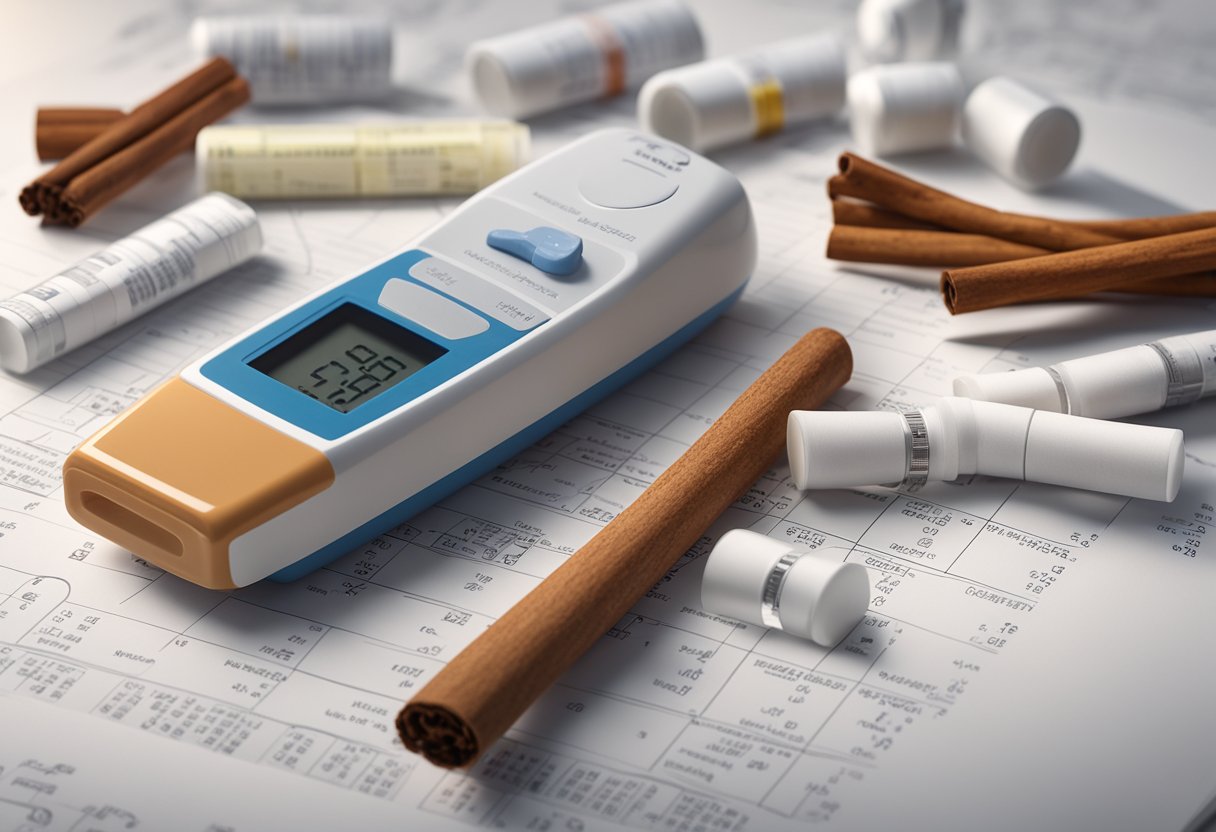
Diabetes mellitus, commonly known as diabetes, is a chronic metabolic disorder that affects how the body processes blood glucose or sugar. Blood glucose is the primary source of energy for the body’s cells, and insulin is a hormone produced by the pancreas that helps regulate blood glucose levels. In diabetes, either the body does not produce enough insulin, or the cells do not respond appropriately to insulin, leading to high blood glucose levels.
Types of Diabetes
There are three main types of diabetes: type 1, type 2, and gestational diabetes. Type 1 diabetes is an autoimmune disease that occurs when the body’s immune system attacks and destroys the insulin-producing cells in the pancreas. Type 1 diabetes is usually diagnosed in children and young adults and requires daily insulin injections.
Type 2 diabetes is the most common type of diabetes, accounting for over 90% of all cases. Type 2 diabetes occurs when the body becomes resistant to insulin, and the pancreas cannot produce enough insulin to compensate. Type 2 diabetes is often associated with lifestyle factors such as obesity, physical inactivity, and poor diet.
Gestational diabetes occurs during pregnancy and usually resolves after giving birth. However, women who have had gestational diabetes are at increased risk of developing type 2 diabetes later in life.
Blood Sugar Regulation
Blood glucose levels are regulated by a complex system involving hormones such as insulin and glucagon, as well as the liver, muscles, and fat cells. When blood glucose levels are high, insulin signals the liver and muscle cells to take up glucose from the blood and store it as glycogen. When blood glucose levels are low, glucagon signals the liver to break down glycogen and release glucose into the bloodstream.
In people with diabetes, this system is disrupted, leading to high blood glucose levels. Over time, high blood glucose levels can damage blood vessels and nerves, leading to complications such as heart disease, stroke, kidney disease, and nerve damage.
In conclusion, understanding diabetes is crucial for managing the condition effectively. By maintaining healthy blood glucose levels through lifestyle changes, medication, and regular monitoring, people with diabetes can reduce their risk of developing complications and lead healthy, fulfilling lives.
Cinnamon’s Role in Diabetes Management

Cinnamon is a spice derived from the bark of cinnamon trees. It has been used for centuries in traditional medicine to treat a variety of ailments, including diabetes. Recent research has shown that cinnamon may have beneficial effects on blood sugar control, insulin sensitivity, and glycemia.
Blood Sugar Effects
Studies have shown that cinnamon may help to lower fasting blood glucose levels in people with type 2 diabetes. One study found that taking cinnamon supplements for 12 weeks resulted in a significant reduction in fasting plasma glucose levels compared to a placebo group [1]. Another study found that cinnamon intake lowered fasting blood glucose levels in people with prediabetes or type 2 diabetes [2].
Insulin Sensitivity
Cinnamon may also improve insulin sensitivity, which is the body’s ability to use insulin effectively to lower blood sugar levels. One study found that cinnamon supplementation improved insulin sensitivity in people with type 2 diabetes [3]. Another study found that cinnamon extract improved insulin sensitivity in rats with type 2 diabetes [4].
Glycemia and Glucose Control
Cinnamon may also have beneficial effects on glycemia and glucose control. One study found that cinnamon intake improved glycated hemoglobin (HbA1c) levels in people with type 2 diabetes [5]. Another study found that cinnamon extract improved postprandial blood glucose levels in rats with type 2 diabetes [6].
In conclusion, cinnamon may have beneficial effects on blood sugar control, insulin sensitivity, and glycemia in people with diabetes. While more research is needed to fully understand cinnamon’s role in diabetes management, incorporating cinnamon into a healthy diet may be a simple and natural way to help manage blood sugar levels.
[1] https://www.ncbi.nlm.nih.gov/pmc/articles/PMC2901047/ [2] https://www.liebertpub.com/doi/abs/10.1089/jmf.2010.0180 [3] https://www.ncbi.nlm.nih.gov/pmc/articles/PMC2901047/ [4] https://www.ncbi.nlm.nih.gov/pmc/articles/PMC2901047/ [5] https://pubmed.ncbi.nlm.nih.gov/14633804/ [6] https://www.ncbi.nlm.nih.gov/pmc/articles/PMC2901047/
Cinnamon Types and Forms

Cinnamon is a spice that has been used for centuries in traditional medicine to treat various ailments. It is available in different types and forms, each with its unique properties and benefits.
Ceylon vs. Cassia
Cinnamon is available in two main types: Ceylon and Cassia. Ceylon cinnamon, also known as “true cinnamon,” is native to Sri Lanka and has a mild, sweet taste. Cassia cinnamon, on the other hand, is more commonly used and has a stronger, spicier flavor.
Ceylon cinnamon is considered to be of higher quality and is less likely to contain the compound coumarin, which can be harmful in large doses. Cassia cinnamon contains higher levels of coumarin and may cause liver damage if consumed in excess.
Extracts, Teas, and Capsules
Cinnamon is available in various forms, including extracts, teas, and capsules. Cinnamon extracts are made by soaking cinnamon bark in alcohol or water to extract its beneficial compounds. Cinnamon teas are made by steeping cinnamon sticks or powder in hot water. Cinnamon capsules are a convenient way to consume cinnamon, and they often contain standardized amounts of the spice.
Cinnamon extracts and teas are a good option for those who want to enjoy the flavor and aroma of cinnamon while reaping its health benefits. Cinnamon capsules are a more concentrated form of the spice and are often used for therapeutic purposes.
It is important to note that cinnamon supplements may interact with certain medications, such as blood thinners and diabetes medications. Therefore, it is essential to consult with a healthcare provider before taking any cinnamon supplements.
In conclusion, cinnamon is available in different types and forms, each with its unique properties and benefits. Ceylon cinnamon is considered to be of higher quality, while Cassia cinnamon is more commonly used. Cinnamon extracts, teas, and capsules are all good options for those who want to enjoy the health benefits of this spice. However, it is important to consult with a healthcare provider before taking any cinnamon supplements, as they may interact with certain medications.
Clinical Research
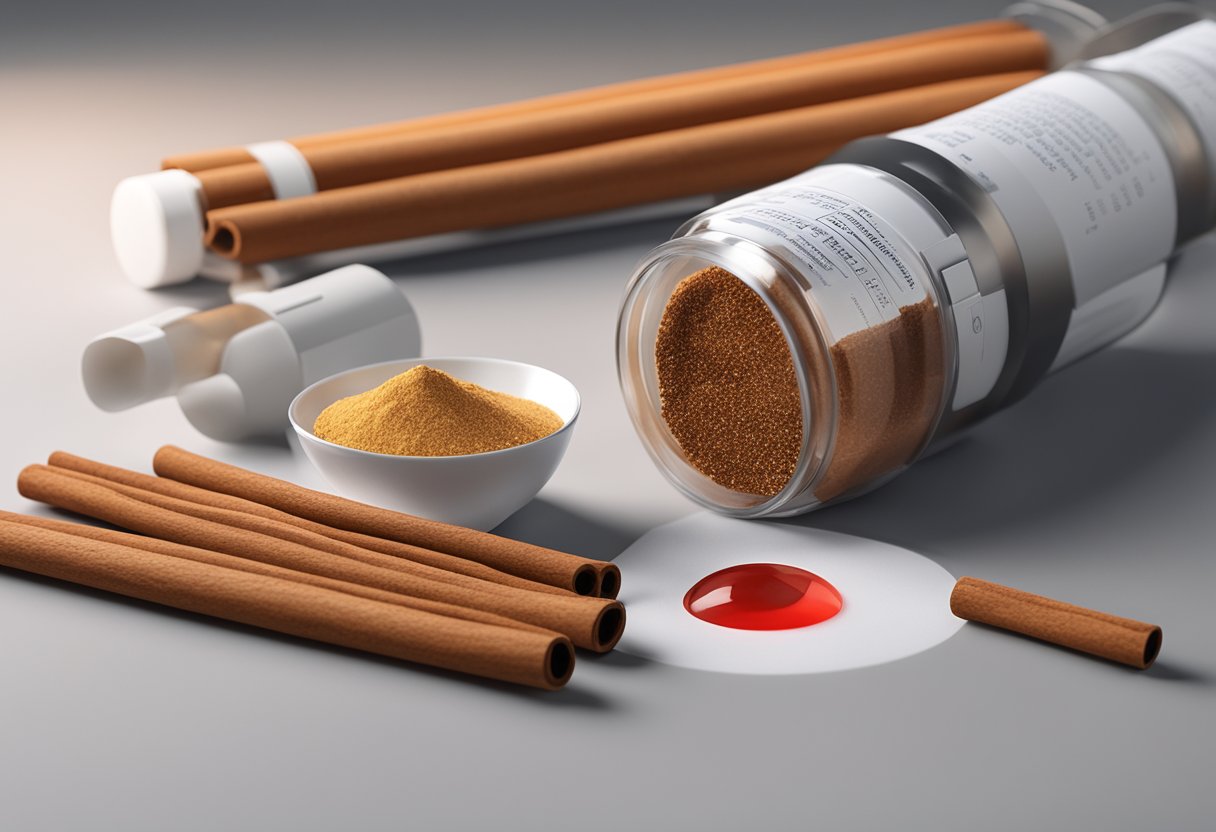
Randomized Controlled Trials
Several randomized controlled trials have been conducted to investigate the effect of cinnamon on blood sugar levels in patients with type 2 diabetes. One such trial published in the Journal of Medicinal Food [1] found that consuming cinnamon lowered fasting blood glucose levels in type 2 diabetics or prediabetics. Another trial published in the journal Diabetes Care [2] found that cinnamon supplementation significantly reduced fasting plasma glucose levels in patients with type 2 diabetes.
A randomized controlled clinical trial published in the Journal of Traditional and Complementary Medicine [3] found that cinnamon supplementation significantly reduced fasting blood glucose levels, total cholesterol, and LDL cholesterol in patients with type 2 diabetes. However, the study did not find any significant effect of cinnamon on HbA1c levels.
Meta-Analysis and Systematic Review
A meta-analysis of randomized controlled trials published in the Journal of Medicinal Food [1] found that consuming cinnamon significantly reduced fasting blood glucose levels in type 2 diabetics or prediabetics. The study also found that cinnamon intake significantly reduced total cholesterol, LDL cholesterol, and triglyceride levels in patients with type 2 diabetes.
Another systematic review and meta-analysis published in the Annals of Family Medicine [4] investigated the effect of cinnamon in patients with type 2 diabetes on glycemic and serum lipid levels. The study found that cinnamon intake significantly reduced fasting blood glucose levels, HbA1c levels, total cholesterol, LDL cholesterol, and triglyceride levels in patients with type 2 diabetes.
Overall, the results of randomized controlled trials and meta-analyses suggest that cinnamon supplementation may have beneficial effects on blood sugar levels and lipid profiles in patients with type 2 diabetes. However, further studies are needed to confirm these findings and determine the optimal dosage and duration of cinnamon supplementation for diabetes management.
Health Benefits Beyond Diabetes

Cinnamon has been used for centuries in traditional medicine to treat a variety of ailments. In addition to its potential benefits for managing diabetes, cinnamon has been shown to have other health benefits as well.
Cholesterol and Lipid Levels
Cinnamon may help improve cholesterol and lipid levels in the body. A study published in the Journal of Medicinal Food found that cinnamon supplementation resulted in a significant decrease in total cholesterol, triglycerides, and low-density lipoprotein cholesterol (LDL-C) levels, as well as an increase in high-density lipoprotein cholesterol (HDL-C) levels in people with type 2 diabetes.
Antioxidants and Inflammation
Cinnamon is also a rich source of antioxidants, which help protect the body against oxidative stress and inflammation. A review published in the journal Nutrients found that cinnamon has been shown to have anti-inflammatory and antioxidant effects in both animal and human studies. These effects may help protect against chronic diseases such as cardiovascular disease, cancer, and neurodegenerative diseases.
Cardiovascular Health
Cinnamon may also have beneficial effects on cardiovascular health. A study published in the journal Diabetes Care found that cinnamon supplementation resulted in a significant reduction in blood pressure in people with type 2 diabetes. Additionally, a review published in the journal Nutrition Today found that cinnamon may help improve endothelial function, which is an important factor in maintaining healthy blood vessels.
Overall, while cinnamon is often touted for its potential benefits in managing diabetes, research suggests that it may have other health benefits as well. Cinnamon may help improve cholesterol and lipid levels, have antioxidant and anti-inflammatory effects, and improve cardiovascular health. However, more research is needed to fully understand the extent of these potential benefits.
Interactions with Medications and Diet
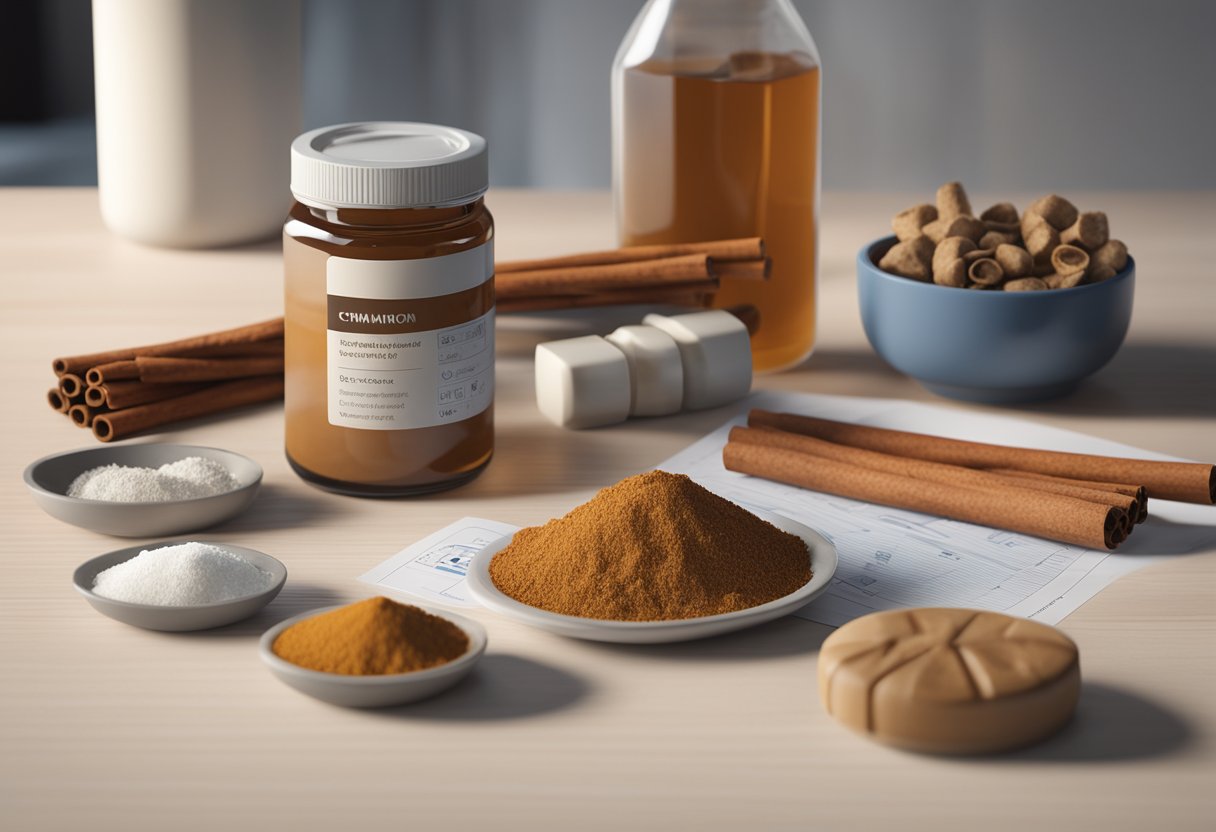
Cinnamon, when taken as a supplement, may interact with certain medications and dietary components. Understanding these interactions is important to avoid any negative effects.
Diabetes Medications
Cinnamon may interact with diabetes medications, including insulin and oral hypoglycemic agents. It may potentiate the effects of these medications, leading to hypoglycemia. Therefore, it is important for individuals taking diabetes medications to monitor their blood sugar levels regularly and consult with their healthcare provider before taking cinnamon supplements.
Herbs and Supplements
Cinnamon supplements may interact with other herbs and supplements that affect blood sugar levels. For example, taking cinnamon supplements along with other blood sugar-lowering supplements such as fenugreek, ginseng, or bitter melon may lead to hypoglycemia. Therefore, it is important to consult with a healthcare provider before taking cinnamon supplements along with other herbs and supplements.
Dietary Considerations
Dietary components such as sugars and carbohydrates may also interact with cinnamon supplements. Consuming high amounts of sugars and carbohydrates while taking cinnamon supplements may lead to an increase in blood sugar levels. Therefore, individuals with diabetes should monitor their sugar and carbohydrate intake while taking cinnamon supplements.
It is important to note that cinnamon supplements are not a substitute for diabetes medications or a healthy diet. Individuals with diabetes should continue to follow their prescribed treatment plan and consult with their healthcare provider before taking any supplements.
Safety and Side Effects
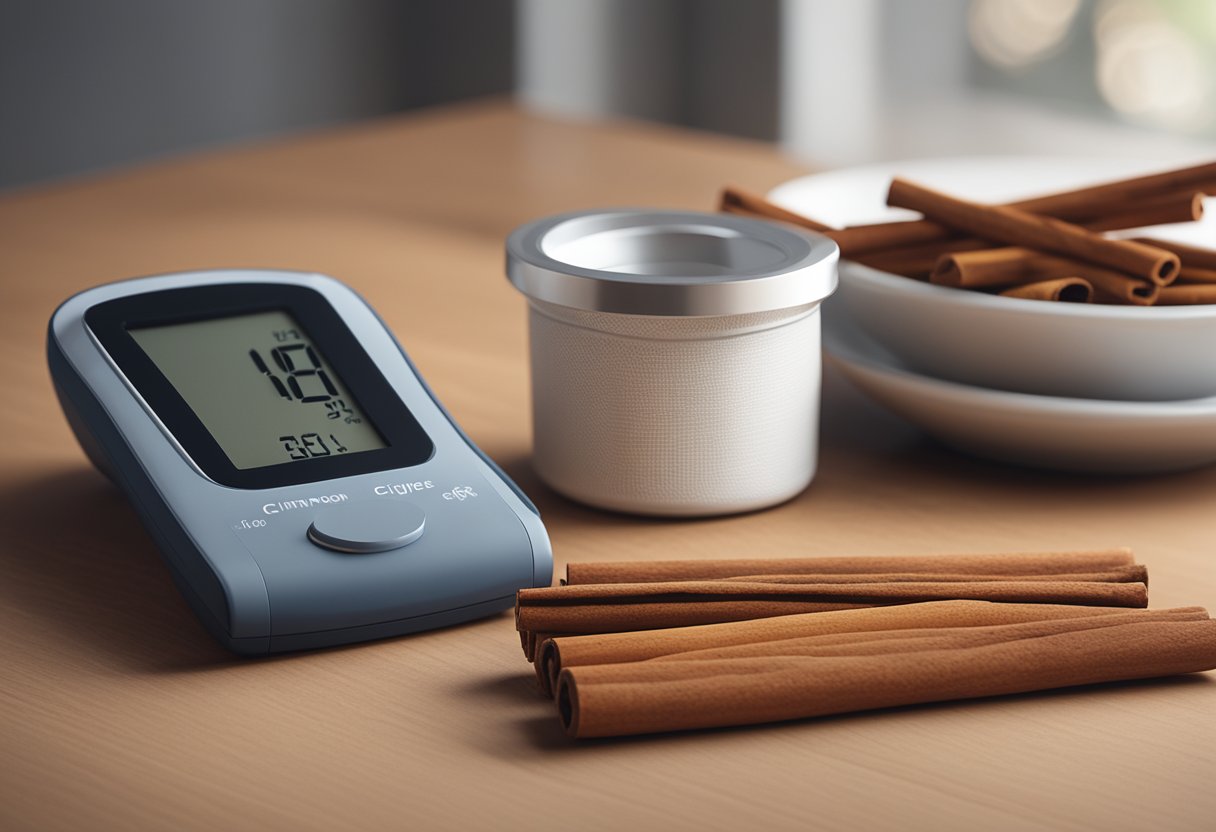
Cinnamon has been used as a natural remedy for various ailments, including diabetes, for centuries. While it is generally considered safe for consumption, there are some potential side effects and precautions to consider.
Liver Damage and Toxicity
Cinnamon contains a compound called coumarin, which can cause liver damage and toxicity when consumed in large amounts. According to a systematic review and meta-analysis, high doses of cinnamon supplements (more than 5 grams per day) can cause liver damage and increase the risk of toxicity. However, the review also found that lower doses of cinnamon (less than 5 grams per day) did not cause any significant harm to the liver.
To avoid the risk of liver damage and toxicity, it is recommended to consume cinnamon in moderate amounts. One teaspoon of cinnamon powder (about 2.6 grams) per day is considered a safe and effective dose for managing blood sugar levels in people with type 2 diabetes.
Dosage and Precautions
In addition to liver damage and toxicity, cinnamon can also interact with certain medications and cause allergic reactions in some people. Therefore, it is important to take precautions and consult a healthcare professional before consuming cinnamon supplements or using cinnamon as a natural remedy for diabetes.
Here are some dosage and precautionary measures to consider:
- Use Ceylon cinnamon (also known as “true” cinnamon) instead of cassia cinnamon, which contains higher levels of coumarin.
- Limit the intake of cinnamon supplements to less than 5 grams per day.
- Monitor blood sugar levels regularly when consuming cinnamon supplements.
- Avoid consuming cinnamon supplements if you are taking medications that can interact with cinnamon, such as blood thinners, diabetes medications, and antibiotics.
- Consult a healthcare professional before using cinnamon as a natural remedy for diabetes, especially if you have liver disease, kidney disease, or are pregnant or breastfeeding.
Overall, cinnamon can be a safe and effective natural remedy for managing blood sugar levels in people with type 2 diabetes. However, it is important to take precautions and consume cinnamon in moderate amounts to avoid potential side effects and interactions with medications.
Recommendations and Usage

Incorporating Cinnamon into Diet
Cinnamon is a versatile spice that can be incorporated into a variety of dishes. One popular way to consume cinnamon is by adding it to oatmeal or yogurt. Cinnamon can also be used in baking, such as in cinnamon rolls or apple pie. However, it is important to note that consuming large amounts of cinnamon may have negative health effects. The recommended daily intake of cinnamon is 1-6 grams per day, which is equivalent to about 0.5-2 teaspoons.
American Diabetes Association Guidelines
The American Diabetes Association (ADA) recommends that people with diabetes consume a healthy diet that is low in saturated and trans fats, and high in fiber. Cinnamon can be a useful addition to a healthy diet for people with diabetes. However, the ADA does not currently recommend the use of cinnamon supplements for the treatment of diabetes, as there is not enough evidence to support their effectiveness.
In addition to a healthy diet, exercise is also important for people with diabetes. Regular physical activity can help improve blood sugar control and reduce the risk of complications. The ADA recommends that people with diabetes engage in at least 150 minutes of moderate-intensity aerobic exercise per week, spread out over at least three days per week.
Overall, incorporating cinnamon into a healthy diet can be a beneficial way to help manage blood sugar levels in people with diabetes. However, it is important to consult with a healthcare provider before making any significant changes to diet or exercise routines.
Potential Complications of Diabetes

Diabetes is a chronic condition that affects the body’s ability to process blood sugar, leading to high blood sugar levels. Over time, this can lead to a range of complications that can affect various parts of the body.
Heart Disease and Stroke
One of the most significant complications of diabetes is an increased risk of heart disease and stroke. High blood sugar levels can damage blood vessels and increase the risk of plaque buildup, which can lead to a heart attack or stroke. In fact, people with diabetes are twice as likely to develop heart disease compared to those without diabetes.
Nerve Damage and Morbidity
Another potential complication of diabetes is nerve damage, also known as diabetic neuropathy. This can cause tingling, numbness, or pain in the hands and feet, as well as other parts of the body. Over time, nerve damage can lead to more severe complications, such as foot ulcers or even amputation.
Morbidity and mortality rates are also higher in people with diabetes. This is due to the increased risk of developing other serious health conditions, such as kidney disease, eye problems, and infections.
It is important for people with diabetes to take steps to manage their blood sugar levels and reduce their risk of complications. This can include making lifestyle changes, such as eating a healthy diet, getting regular exercise, and quitting smoking. In some cases, medication or insulin therapy may also be necessary to manage blood sugar levels.
Frequently Asked Questions
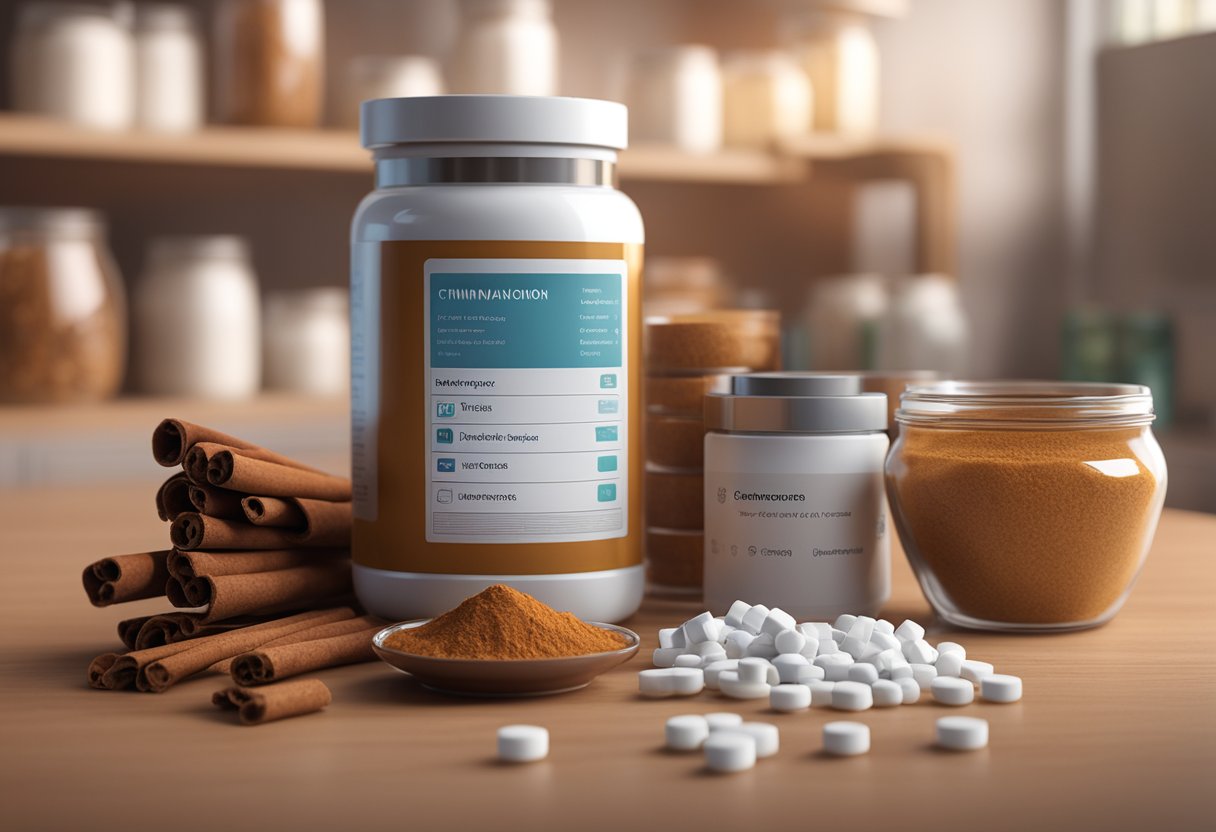
What is the recommended dosage of cinnamon for managing diabetes?
The recommended dosage of cinnamon for managing diabetes varies depending on the individual and the form of cinnamon being used. In general, studies have used doses ranging from 1 to 6 grams per day, with most studies using doses of 1 to 3 grams per day. It is important to note that cinnamon supplements are not regulated by the FDA, and the quality and purity of supplements can vary widely.
How does cinnamon influence blood sugar levels in diabetic patients?
Cinnamon has been shown to improve blood sugar control in some studies, although the exact mechanism is not well understood. It is thought that cinnamon may increase insulin sensitivity, enhance glucose uptake by cells, and slow the breakdown of carbohydrates in the digestive tract.
Are there any potential side effects of using cinnamon as a supplement for diabetes?
While cinnamon is generally considered safe, some individuals may experience side effects such as allergic reactions, mouth sores, or digestive issues. Cinnamon may also interact with certain medications, so it is important to consult with a healthcare provider before taking cinnamon supplements.
Can cinnamon interact with other medications commonly prescribed for diabetes?
Cinnamon may interact with medications such as blood thinners, diabetes medications, and medications metabolized by the liver. It is important to talk to a healthcare provider before taking cinnamon supplements if you are taking any medications.
What are the differences between Ceylon cinnamon and other varieties in the context of diabetes management?
Ceylon cinnamon, also known as “true” cinnamon, is generally considered to be of higher quality than other varieties such as cassia cinnamon. Ceylon cinnamon contains lower levels of coumarin, a compound that can be toxic in high doses. While both types of cinnamon have been shown to have blood sugar-lowering effects, some studies suggest that Ceylon cinnamon may be more effective.
How quickly can one expect to see changes in blood sugar levels after incorporating cinnamon into their diet?
The time frame for seeing changes in blood sugar levels after incorporating cinnamon into the diet can vary depending on the individual and the dose of cinnamon being used. Some studies have shown improvements in blood sugar control after just a few weeks of cinnamon supplementation, while other studies have not shown significant effects. It is important to monitor blood sugar levels closely and work with a healthcare provider to determine the best course of treatment for managing diabetes.